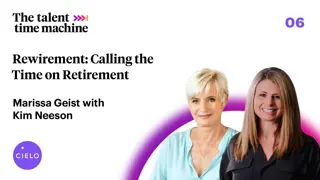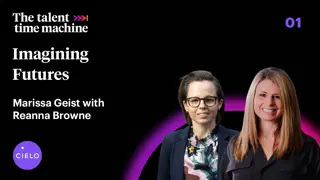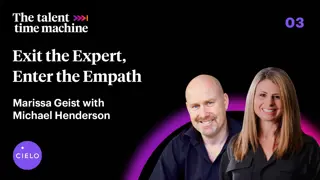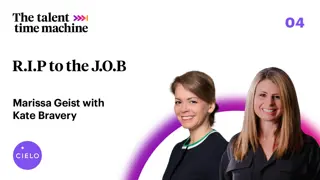What AI in education could mean for the workplace
With technology and access to information progressing at incredible rates, the world of work may be vastly different by 2050. What will the future of education look like and how will it prepare the workforce of tomorrow?
In episode five of “The talent time machine” podcast, renowned futurist Dr. Ian Pearson spoke with CEO Marissa Geist about what AI in education could mean for employees and employers. Read on for highlights of their conversation.
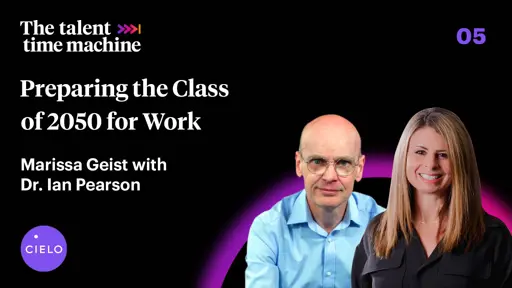
Editor’s note: This interview has been edited for clarity and brevity.
How will technology change the future of education?
Ian: It's a good question. I think an awful lot of things are going to change over the next 20 or 30 years, and we're just starting an enormous shock with the arrival of ChatGPT. And most of the futurists are coming to the same conclusion that, in the future, it won't be us or the machines, it'll be us plus the machines, working together.
And that really applies regardless of what your job is, you won't be able to get all of that from AI. Context is important, and understanding how things relate to human culture, political systems, and everyday life. Only humans really understand that from the ground up.
An AI can read about it online, but it hasn't got that first-hand experience of being a human. That really is where the partnership comes from. The more advanced technology becomes, the more it frees us and forces us to just become human beings, and to focus on what that really means at its core.
Marissa: We thought everyone needed to be a programmer, that was the path forward. And then we thought everyone needs to be a web designer, that’s how you’ll be relevant and not be left behind in that revolution. And now, we have to think about what skills we should be investing in and telling our kids are the paths forward.
People will need human skills. They will need to be adaptable and resilient, whatever life throws at them.
What skills should young people build to stay relevant in the future?
Ian: That's exactly the questions I was getting asked 15 years ago going to talk to school kids. And of course, the teachers back then more wanted to teach them how to use computers and access the internet. You don't need to teach kids that now, they've just grown up with it. As for teaching them programming, by the time these kids leave school, they'll be able to just explain to the computer what they want, as ChatGPT does.
Some people still need to, if you're a scientist or you're a computer designer for example, you need deep knowledge, or if you’re going to be the one that's designing the next generation of something or quantum computers. Most of us don't need to know anything at all because the computer does. So, what is the skill you really need to have? The emotional skills, the human skills, dealing with other people as people, relating to them, having empathy and sympathy.
Think about a top consultant for example, who is very well paid but with a terrible bedside manner. In 20- or 30-years’ time, they can be replaced. But a nurse – who typically is a sort of a caring professional – comes along and gives you some sympathy, maybe holds your hand, gives you some nice words.
Sure, they're not quite as well qualified as a top consultant, but that job can't be automated, so the nurse is inherently more valuable than the consultant once all of this takes root.
People will need human skills. They will need to be adaptable and resilient, whatever life throws at them. They're going to have to be able to get on with other people and get on with machines as well. But that's what you will be doing in 2050. That's what your kids will be doing in 2050. There will be human beings with a “best friend” who's a very sophisticated AI.
Marissa: So, people and machines will be inseparable. I suppose in some ways, we're already inseparable from our machines. I have a watch that tells me if I slept last night, and I never take a map with me anywhere now.
But if the learning is all about being human, the traditional classroom setting could be totally ill equipped to teach those skills.
CieloNobody needs a manual with a computer anymore, they're born learning.
Will education need to evolve if we need to focus more on teaching social skills and empathy?
Ian: A lot of the most valuable skills you learn in education, you learn in the playground, at school, or in the bar or at a party when you hit university. Those are the valuable skills: how to deal with other people, how to influence other people, how to make friends, how to offer leadership, how to overcome things. Those are the really important skills. However, you do still need the rest of the education.
If I don't have the basic knowledge, I don't know what questions to ask ChatGPT or I don't know what to type into my calculator. So, you still need to go to school to have the education as a foundation, in order to ask the right questions to get the best back from the machines. Otherwise, it's all useless. You don't know what to believe.
Marissa: That's a great point. So, with the arts, the humanities, the sciences, it's the logic and the foundation, it's exercising the muscle and being able to have context. It's all of the things that actually traditional universities still teach.
Even if the basic concept of education is still the same, I wonder if we’ll still have places where people go to get that higher learning, or if it won’t be in person.
Ian: I think you need to use the technologies available, but you still need to have the other side, the human side of going to university as well. You can't have one without the other, both are equally important.
And longevity is increasing. People going to university now will probably live to 100, so you're going to be building skills that need to last you a very long time. Or you might have to go back and be re-educated every few decades. It’s going to be a very different life, but you’ll still need to have the school, the university, the playground, and the bar.
Marissa: I look at my children and I juxtapose them against my parents in terms of the speed of learning. Nobody needs a manual with a computer anymore, they're born learning.
It's fascinating how young people interact with technology, even in school. Memorization was already on the way out when I came into school, the internet wasn't around. It was a thing in some government labs, but for access to information, we still had to know how to use the Dewey Decimal System in the library.
My kids don't have to do that. And they can process information so much more quickly than I can. If you think about earlier days or earlier learnings, I wonder if we can keep that information processing and human connection when so many kids won't know how to learn.
What could be some unintended consequences of educational change in 2050?
What should we watch out for as we use AI in education?
Ian: I always like to look at the positive and the negative side. Unfortunately, all of this wonderful education that gives everybody AI or a quantum computer they can hold in their hand also works for the bad actors and the future dictators. It works for the bad as well as for the good, so that’s something we should be wary of.
We need to guard against that, and it's about balance. It's about looking at the dangers and saying, “we need to protect ourselves, but we also don't want to destroy society here.”
What’s your advice to a child today preparing for the world of work in 2050?
Ian: Well, I would go back to Charles Darwin. People talk about him saying “survival of the fittest,” but it was actually about “survival of the most adaptable,” the ones that can adapt best to the changes in their environment. So, it's about resilience, adaptability, and agility when things change. But that really is the core skill.
If you can cope with whatever life throws at you and technology has changed yet again, you can still cope with that because you will just learn this new tool. You've got that self-confidence, that resilience. It’s “here we go again, let's jump into the next version of AI.” That kind of attitude to life will get you a long way. I think that’s the kind of skill set we need to teach our kids – self-confidence and analytical thinking.
Marissa: I'll take these learnings home and tell my kids that they're doing OK, they're doing the right things: learning to play, learning to be with other people and to think critically. Those are still going to be great traits in the future.
About the experts

Chief Executive Officer, Cielo
Marissa is the Chief Executive Officer of Cielo, the world’s leading global talent acquisition partner. She joined Cielo in 2015 as Senior Vice President of Global Operations, where she was instrumental in scaling Cielo’s delivery model.
LinkedIn connect
Futurologist
Ian Pearson has been a full time futurologist for over 25 years, tracking and predicting developments across a wide range of technology, business, society, politics and the environment.
LinkedIn connect